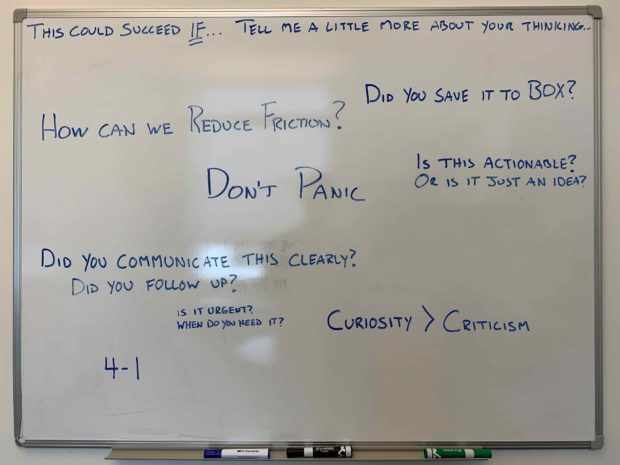“It’s what we learn after we think we know it all that counts.”
Frank McKinney Hubard, Fairmount (Ind.) News, 17 Feb. 1913.
Just before leaving the office in March 2020, I wrote the following on my whiteboard: Don’t Panic. Those words would remain undisturbed for more than a year as we continued to work from home during the height of the pandemic. When I returned to the office in late 2021, I couldn’t bring myself to erase it. The dry-erase ink seemed physically and psychically etched into the laminated surface.
It has been a good reminder to keep things in perspective. Since that time, I’ve added a few more notes. These gentle nudges helpfully steer me toward more sensible actions, and serve as a warning light for when I’m drifting off track. Here is what I have as of this writing in May 2023, with brief explanations.
“This could succeed if…”
I have a tendency to immediately focus on everything that could go wrong, but the minute I begin thinking about what it would take to make something work, I instantly begin to find manageable solutions. Oftentimes, current resources (or lack thereof) don’t make those solutions possible, but outlining the steps from A to B is more than half the struggle.
“Tell me more about your thinking…”
Where “This could succeed if…” is something I tell myself, “Tell me more about your thinking…” is something I need to reminder myself to ask of others. Both statements help to curb my natural tendency to be a contrarian, seeking out the pitfalls in any idea.
“Curiosity > Criticism”
All things being equal, if I’m not sure how to respond to a request or a proposal, or if I don’t have an immediate answer, or if I’m feeling defensive, I find it’s always best to default to a curious response, instead of a critical one. Curiously opens doors in a conversation. Criticism closes them.
“How can we reduce friction?”
This is an important question for me when developing new programs or seeking out ways to improve existing programs. Oftentimes, the reason an initiative fails is something as simple as there being too much friction. For example, maybe the reason we get low response rates on some surveys is because it’s just too much work (just enough friction) to stop and fill out a form. How could we make that processes more integrated into existing habits or practices?
“4-1”
Anytime you are trying to balance “good vs. bad”, whether it’s compliments vs. criticisms, or pros vs. cons, or giving favors vs. asking favors, I’ve found that the 4:1 ratio is just about the right mix. Whether this has any relationship to the Pareto Principle, I couldn’t say.
“Did you save it to Box?”
Email 👏🏼 Is 👏🏼 Not 👏🏼 A 👏🏼 File 👏🏼 Storage 👏🏼 System 👏🏼. This past year, one of my employees left and we lost so much critical information about projects in-play because they used email to organize their knowledge. Whether it’s file attachments, advice, answers to questions, or communiques, none of that information is accessible if it’s stored in someone’s email account. The essential structure and protocols for email have not changed in 40 years. It was never built to be an information management system, and it has not improved in that regard (other than the fact we no longer have to watch our email storage limits).
“Is this actionable? Or is it just an idea?”
I enjoy starting new projects and experimenting with new technologies and platforms. But as I am fond of saying to my team: “we don’t need ideas, we need actions.” There are plenty of smart, creative folks working in academia, but not every ideas is worth pursuing (especially if you don’t actually have the resources). So when I’m presented with new ideas, I remind myself to pause before taking action. Maybe this is one of those “let it go and see if it come back to you” type of ideas.
“Did you communicate this clearly? Did you follow up?”
I overestimate my ability to communicate to others. I think most of us do. “It makes sense in my head! Surely, you see it the same way as I do!” Of course, this is rarely the case. So I need to remind myself to over-communicate when possible, and to follow up after folks have had time to sit with the new information.
“Is it urgent? When do you need it by?”
This was my most recent addition. MPOW operates on the hyperactive hive-mind model: no project planning or mapping out milestones. Just brute force emailing and DM’ing until the project gets done. This means I’m constantly getting random, unsolicited requests for support on projects that, until that very moment, I was not aware of. It’s frustrating to say the least. But I can mitigate some of that frustration by always asking whether the request is urgent, and/or when is it needed by. Unfortunately, the answer is usually “as soon as possible.” 🙄
What I’m reading
Photography is Dead. Just Admit It and Move On. There Is No Hope. by Don Giannatti
“With AI there is no painting WITH light, as “photograph” means. There is the painting of light — illustrators, painters, sketches, collage… all of that. And that is cool.”
Twitter Is a Far-Right Social Network by Charlie Warzel
I’ve been on Twitter since 2007, and it hasn’t always been a delight, but the last year has been utterly miserable. Every time I log in, my outlook on the future of online communities plummets.
News from the garden

This spring, we have had an overabundance of cloudy, cold, and/or rainy days. Everything in my garden is growing slower than usual. This last week, however, the sun began to show its face. My trionfo violetto beans are finally starting to stretch their legs!
Links to the past
- 6 years ago: Peaches for me. This is what my peach tree is supposed to look like this time of year. I’m hoping my tree’s current lack of foliage is simply a result of this year’s overly wet and too-often cloudy Spring.
- 8 years ago: Tear down that wall. And John marched around the walls seven times. On the seventh time he took the holy sledgehammer and brought down the walls of the bamboo city.
- 10 years ago: All established institutions seek to persist. Telling a librarian that ‘this is the future; deal with it’ is not a wise strategy — because all established institutions seek to persist.
Overheard online
“Once again I’m going suggest that every person who wants to ban a book has to show knowledge of the book and its contents, preferably by being quizzed, without access to notes and/or a phone, by a librarian, in person, at the library. If you clearly don’t know the book: Fuck off.” (@scalzi on Twitter)
